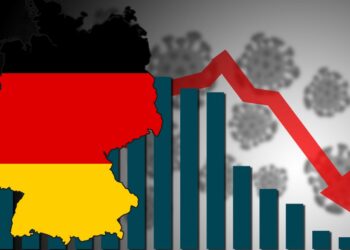
Despite the federal government’s effort to downplay the threat of a huge debt challenge hanging heavily on the neck of every citizen of Nigeria, concern has continued to mount and indeed escalated as to prognosis for the future.
This is even as the World Bank insists that Nigeria’s debt burden is becoming dangerous for her continued economic sustainability.
In its latest expose on the subject, the Bretton Woods institution specifically categorized Nigeria as being among the 10 countries with relatively very high debt risk exposure.
According to the report, Nigeria is ranked fifth on the list with $11.7bn IDA debt stock, while India led the list with $22bn IDA debt stock, followed by Bangladesh with $18.1bn IDA debt stock, Pakistan with $16.4bn IDA debt stock, and Vietnam with $14.1bn IDA debt stock.
Ethiopia with $11.2bn IDA debt stock, Kenya with $10.2bn IDA debt stock, Tanzania with $8.3bn IDA debt stock, Ghana with $5.6bn IDA debt stock, and Uganda with $4.4bn IDA debt stock were other countries on the list, according to the financial statement by the International Development Association (IDA), and which is part of the World Bank’s FY21 audited financial statements.
President, World Bank Group, David Malpass, said the bank’s support to client countries surged to $157bn over the last 15 months to help address increased poverty and inequality issues as well as the impacts of COVID-19.
Malpass explained that the unprecedented level of commitments helped countries strengthen health systems, protect the poor and vulnerable, support jobs and businesses, promote economic growth, and lay the foundation for green, resilient and inclusive recovery.
“IDA faces two types of credit risk: country credit risk and counterparty credit risk,” the financial statement read.
Country credit risk according to the report, is the risk of loss due to a country not meeting its contractual obligations; and counterparty credit risk is the risk of loss attributable to a counterparty not honoring its contractual obligations.
Though, the report said it was discovered that Nigeria’s undisbursed balance with the World Bank is about $8.656bn as at June 30, 2021, there have been a consensus that all is not well with the countries debt position.
Recent, report from the National Bureau of Statistics reveal that documented total debt stock of the country stood at $33.6 billion.
With this level of debt, Nigeria’s debt to gross domestic product (GDP) is 25 per cent far below the international threshold of 58 per cent and leaves huge room for the Federal government to borrow more.
Reportedly however, the official debt figures which the Debt Management Office (DMO)released recently did not capture the debts of some states. More disturbing is that the Central Bank of Nigeria (CBN) has also lent the government about $25billion (N10trn) through means and ways were also not part of the total debt. In this regard, the one billion naira question in the mouths of many are; how much does Nigeria really owe? What is the implication of the huge debt over hang for the country and future generation? How much does the country spend to service her debt? Can Nigeria get out of the debt trap at the current pace of borrowing?
Discerning Nigerians had raised alarm even before now that the country’s total debt stock was becoming abnormally huge and could aggravate her already challenging economic status.
However, commenting on the uncomfortable debt position of the Country, Chief Executive Officer of HighCap Securities limited, Mr. David Adonri told Business Hallmark in a telephone interview that Nigeria was already in a debt trap.
He projected that going by current trends, before the end of 2021 the country’s debt stock would rise to $40billion. Adonri who said the present government had made a mess of the economy expressed sadness that over 90 per cent of the nation’s revenue was now deployed to service her huge debt.
According to him, the country now almost borrows to service loans and now uses the paltry sum that is left to run the government. He noted that the nation’s debt stock stood at about $35billion while additional loan of about $6billion was recently approved for the government by the national assembly. ‘We have a huge problem in our hands’, he surmised.
A finance expert who wouldn’t want to be mentioned said Governments tend to take on too much debt because the benefits make them popular with voters. Increasing the debt allows government leaders to increase spending without raising taxes. Investors usually measure the level of risk by comparing debt to a country’s total economic output, known as gross domestic product (GDP). The debt- to -GDP ratio gives an indication of how likely the country can pay off its debt.
Speaking at another forum yesterday, Former Emir of Kano, decried the deplorable state of the economy,adding that economic achievements of over 35 years have disappeared in the last 6 years due to incompetence and mismanagement of the current leadership.
“You look at the World Bank economic quality indicators and you will be shocked at what you are seeing. If we take Nigeria’s GDP per capita on a PPP (Purchasing Power Parity) basis, in 1980 it was $2,180 and by 2014, it was $3,099, which increased it by 50 per cent.
“Between 2014 and 2019, this number fell to $2,229. At this rate, by this year or next year, Nigeria’s GDP per capita on a PPP basis will be back to where it was in 1980.
“We have not moved. We wiped out in five years all the progress made in the preceding 35 years. That is the kind of conversation we should have which we are not having. And what are the key drivers of this: you’ve got rising population growth, slow GDP growth, higher rates of inflation, and devaluation of the currency,” he said.
“For decades in this country, we have wasted our resources. Look at the fuel subsidy, which I’ve been talking about since 2011. We take trillions and trillions of naira and tell people we are giving them cheap fuel.
“At the end of the day, we have bankrupted ourselves. You’ve set up an economic system where today 90 per cent of government revenue goes to debt servicing and we’re still borrowing. We are spending trillions on fuel subsidy. And then we get the Central Bank to print trillions because we cannot pay salaries if we do not print the money. And as the money is printed, we create inflation and then we create devaluation’’, he said.
Information from the Debt Management Office (DMO) revealed that the country’s debt jumped by N20.8tn between July 2015 and December 2020. Total debt stock according DMO stood at N12.12tillion as of June 2015.
There is a consensus that the country’s rising debt has reached a critical level and might scare investors who have already reduced their exposure to the country.
‘’If a country keeps spending, then its bonds may receive a lower S&P rating. This indicates how likely it is that the country will default on its debt’’, said an analyst who would not want to mentioned in print.
The real sad part of the story is that all things considered, Nigeria may be headed there sooner or later. And that to say the least, is not palatable.









